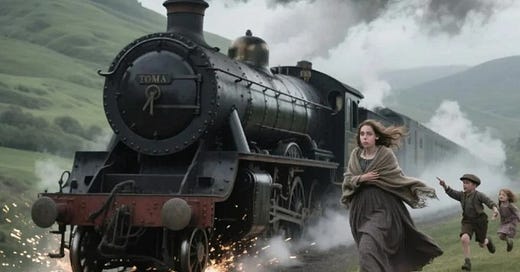Image by Flux-1 Kontext (edit) at Abacus.ai June 2025.
Questions for Harriet: 🌿 Harriet Allery (1819–1888) — Totnes, Devon!
My imagined visit to her in a modest cottage in the 1870s, a widow reflecting on a life of rural devotion, continues.
What was it like to marry at fifteen—were you frightened, excited, or both? How did you manage a household with so little and still raise three children? When you go to the Totnes market, what do you look forward to most? Do you remember a moment in your life as an Innkeeper's wife when you felt truly proud? What remedies or cures did your mother teach you that still serve your family? How did you feel when the railway came through—hopeful, or wary of change? If you could choose one hymn to be sung at your funeral, which would it be? What do you miss most about the way things were when you were a child? Has your faith ever been tested? If so, how did you find your way back? What do you hope your children remember most about you?
Chapter 5: When the Railway Came
“I feared it would change everything. And it did—some for the better, some not.”
It began as a whisper, really soft and uncertain, passed between women at the market like gossip over apples. Tracks, they said. Steam engines, great iron beasts that would carry people and goods faster than we’d ever imagined. I didn’t believe it, not at first. Totnes was a town of slow steps and sturdy wagons, of Sunday walks and quiet lanes. Not of roaring machines and black smoke.
But soon the men with rolled maps came, pointing at our hills and hedgerows. Then came the others, with picks and hammers and that unrelenting clang that seemed to shake the soil itself. I watched from our lane as trees were felled and earth moved as though it were no more than dust.
Samuel, ever practical, was more hopeful than I. “Might bring more trade,” he said, tugging off his boots by the hearth. I only nodded, my fingers twisting the hem of my apron. I didn’t know what to feel. A part of me understood—easier passage for our wool and cider, quicker trips to market in Exeter or Plymouth. But another part feared it. What would this speed, this noise, bring with it? Would it chase away the stillness I’d grown to love?
The first time I saw the train, I held my shawl tight to my chest as though it might leap from the tracks. It came like thunder—metal screeching, smoke pouring, a black dragon waking from the hills. The children were delighted, of course. Thomas tried to race it, legs flying. Alice asked if it breathed fire. I couldn’t answer. I just watched, heart unsteady.
Change crept in after that, not all at once. The market offered things we’d never seen before—spices, coloured cloth, even tinned meats. New faces appeared at the inn, and new voices echoed in the chapel, asking different questions. Some neighbours packed up and left for jobs farther down the line. I hadn’t thought I’d miss them so keenly, but I did.
Image by Ideogram 3.0 on Abacus.ai, June 2025
Yet it wasn’t all loss. Letters came quicker. Once, a parcel arrived—wrapped in twine and smelling faintly of lavender. It was soap, fine and milled, from a cousin I hadn’t heard from in years. I held it like treasure.
In time, I stopped fearing the train. I didn’t love it. But I learned to live with it, the way one lives with wind or winter—knowing you can’t change its coming, only how you stand against it.
Ms Perplexity Responds:
Revolution in Connectivity and Economy
The South Devon Railway reached Totnes in 1847, connecting it directly to Newton Abbot and Plymouth 12. This dramatically reduced travel times and costs, opening up new economic opportunities for local industries and residents.
Before the railway, goods and people moved via packhorse or wagon, which was slow and limited in capacity 3. Steam trains enabled bulk transport of goods—such as wool, coal, and agricultural produce—supporting the growth and modernization of local industries, especially the woollen mills of Buckfastleigh, which relied on the railway for both inbound coal and outbound products 4.
The railway also facilitated the movement of people, making it easier for workers to travel to cities for employment and for visitors to reach Totnes and nearby towns, stimulating the local economy 54.
Reflection Prompt:
What changes—technological, cultural, or social—most impacted your ancestors’ communities? How did they respond to those shifts in ways that echo in your own life today?








